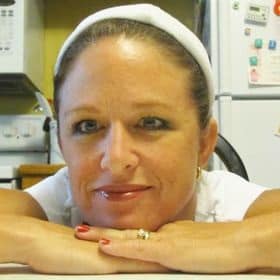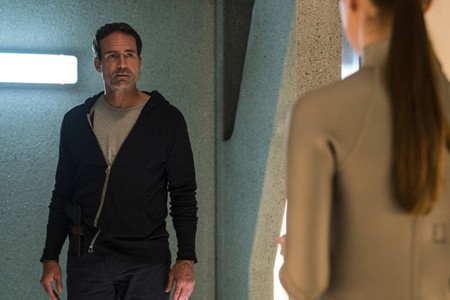The most definitive aspect of Wayward Pines’ second finale is that it is far from final. Instead, it’s a bellowing bid for another ten episodes. There are interesting aspects to “Bedtime Story,” but in the final analysis it’s challenging to see the meaning behind it all. The plot barely advances, we learn nothing new, and nothing is resolved. Not even one of our cool guesses was employed. But then, you take a couple of hours and watch it again … and begin to see what alluded you the first time. Oddly enough, Wayward Pines has turned out an allegory about fundamental scientific truths and spirituality. We will get to those deeper meanings in a minute.
So, what actually transpires in the finale? Well, Theo takes over as de facto leader with plans of becoming a suicide bomber before Kerry stops him. Xander and Rebecca are inseparable because they have a baby on the way and, well, her marriage with Theo was un-salvageable anyway. Kerry realizes her son was a monster the future can do without. The Abbies gather to yowl, people are frozen, and life goes on as it did before Wayward Pines was first defrosted. Here’s how it all went down.
Wayward Pines Recap: Who Decides Who Lives and Who Dies? >>>
The Basic Storyline of “Bedtime Story”
Some semi interesting stuff goes down for several people, but the gist of the episode is that half the population is frozen for the future and the rest are left behind to whatever awaits them outside the perimeter. There’s some mayhem and looting when the true plan becomes evident, but surprisingly little. Looting in the darkened town is reminiscent of the first fall of Wayward Pines when Pilcher was still at the helm.
As for the Abbies, they do disappointingly little throughout the episode besides run through the forest and howl at the sky. Margaret is very much alive and kicking and yowling at her henchmen. More and more gather like ants swarming a picnic cupcake and something seems to be brewing, but absolutely nothing happens. You’d think by now they would have developed some kind of language other than screeching.
Another One Bites the Dust
“Bedtime Story” picks up right after the gun goes off between Kerry and Jason. Jason is alive, but just barely, and Kerry is in shock over having shot her lover-son. Once Theo removes the bullet, Jason goes into cardiac arrest. Theo limp-wristedly shocks the boy leader’s heart twice then calls time of death, as the snotty-nosed medical resident whose name I never caught (Oliver? Scott? Oh, Oscar! Thanks, IMDB) stands with his mouth hanging open and his finger up his nose. Scott accuses Theo of foul play through apathy, and Theo never outright admits anything, but doesn’t really deny it either. Scott also figures out the oedipal connection between Jason and Kerry because of the extremely rare blood type they share. You’re a little too little and late, Scott buddy.
Theo makes the death announcement to the people gathered outside the hospital and calls for a return to humanity. The inhumanity of Pilcher and Jason’s dictatorship dies along with them, he announces. We may not have asked to be here, but here we are. Let’s go forward as best we can. It’s a decent speech and leadership looks good on the doctor.
C.J. Makes An Argument For Newton’s Third Law of Physics
After Jason is sent to swim with the fishes, C.J. sits Theo down to discuss who has to stay and who gets to freeze forward to the future. Theo is thoroughly disgusted by the whole thing, but C.J. reminds him that decisions have to be made sometimes. Every choice in one direction is a choice not to go in another direction. If one person lives, in this case, another dies. This is how the world goes ’round.
Theo explains that he never viewed his work as “saving the world.” It was always one surgery after the next, one case after another. He wasn’t playing God like Pilcher thought he was doing. C.J. insists that Theo was saving the world, one person at a time. This message is built upon later when Theo is alone.
So, is this Wayward Pines‘ message: We all give life and take it away through our choices, though we may never know the full impact of them on the universe around us? (Do I hear a plea for a greener world in there somewhere?)
In the very (anticlimactic) end, after everyone is put to sleep in their pods, C.J. imagines his wife there with him as he turns off all power except that which powers the pods. For a moment, he has an opportunity to terminate the power to all of the pods as well, thereby putting an end to any possible future for humanity as he knows it. She asks him if it was all worth it. Reflecting back, he must have been thinking about every action having an equal and opposite reaction, every direction taken is another direction rejected. In the moment, he chooses to make the small choice not to push the termination button. That small action is what makes a third season possible. (If America forgives Wayward Pines for this extremely subtle finale).
Rebecca and Xander Freeze Happily Ever After
The militia tries to leave Xander behind when they take Rebecca to the cryo pods. She refuses to go without him, but Xander convinces her to go. She is obviously in denial about the fate of her rebellious second husband who Jason would never want to have in the new world. Xander barely holds it together as he puts on the brave face for Rebecca. She leaves, heartbroken. In the end, Theo swoops by to gather Xander and Frank to be frozen. Xander asks him why he saved his adversary, to which Theo replies that he doesn’t know. We don’t always know why we do the something good. It just feels right, right? This must be another of the important messages of the season.
Theo Leaves a Note Before Attempting a Sacrificial Suicide
For a while it looked like Theo might turn his back on any possible future for himself in the 61st century. Maybe he’d simply opt to take his chances rather than become part of the future Wayward Pines circus? However, Theo’s storyline takes an unexpected twist.
Instead of eschewing a future for himself, Theo decides to give the survivors the best chance possible of surviving by injecting himself with three viruses Pilcher had saved in the lab, presumably for biological warfare: Bubonic Plague, typhoid, and marburg. This is a difference in philosophy and attitude. One of self-sacrifice. His plan was to let the viruses incubate inside him, then to walk out past the perimeter and let the Abbies eat him. After a number of years the entire species would be wiped out.
As he’s preparing the syringes he records an audio tape for future generations in which he explains that there is no such thing as a “Greater Good;” there is only “Good.” No matter how big or small. Interesting how this ties into what C.J. was talking about, right?
Kerry Throws Herself On the Sword Syringe of Self-Sacrifice
When Kerry and Jason were battling she hadn’t known that he was her son. Theo is the one who gets to break that nasty truth to the powerful little missy when she insists on knowing the truth. When reality hits her Kerry becomes violently ill. Does she regret killing her only son? She isn’t sure, but she does see how twisted this whole project has been from the start.
When Theo comes back to the lab to inject himself he finds that Kerry had found his audio tape and injected herself. Her plan is to fulfill his.One things she does know for sure is that the future is better off without people like her son. In the penultimate scene we see Kerry walk outside the electric fence to the sound of gnashing of Abbie claws and teeth.
And The Abbies Lived Happily Ever After?
The final scene is the jungle where the Abbies have always been hunkering. It’s a peaceful scene not unlike earlier flashbacks of the world before Pilcher’s helicoptered snipers first fired upon the unsuspecting Abbies. A mother sits on a log with a baby in her arms. The interesting thing is that the baby is a lot more pale than the rest of its species. It seems to have blond hair as well. The last we saw of Hassler was when he was among the Abbies. Are we to assume he did, indeed, learn to live with and even bed with them? And what will the residents of Wayward Pines wake up to find in the 61st century? What do you think happened? Were you satisfied with this ending? Sound off below.
Was It All About Good And Bad?
Was this the message of Wayward Pines: There is only one good. There is only one bad. We do the good we can. We choose against the bad. In this world which likes to see things in shades of gray, maybe that gray is simply a justification. The world really is black and white. There really is only good and bad. Perhaps the gray is God’s job? Or maybe that gray is the playground God provides for us to struggle in as we figure out what really is black and what really is white? Is this what Wayward Pines is getting at?
But … what happened to the scientific/psychological thriller aspect of the series … or is this really, truly, and in retrospect, the mother of all psychologically thrilling debates faced by our species? I feel an editorial coming on.
There you have it, folks. Another season of Wayward Pines is in the can. Stay tuned next summer to see if we’ll get a third. Despite this semi-ambiguous and uneventful finale, I will be looking for a third season to fill in the months before the fall fervor.
(Images Courtesy of FOX)

Contributing Writer, BuddyTV

